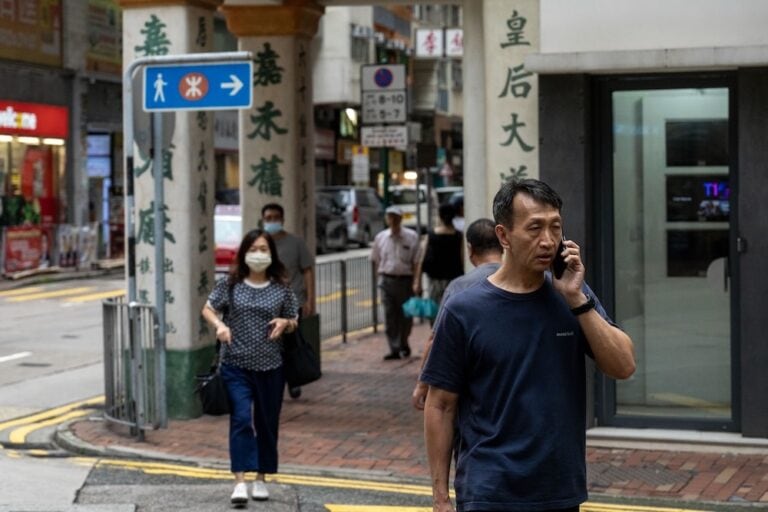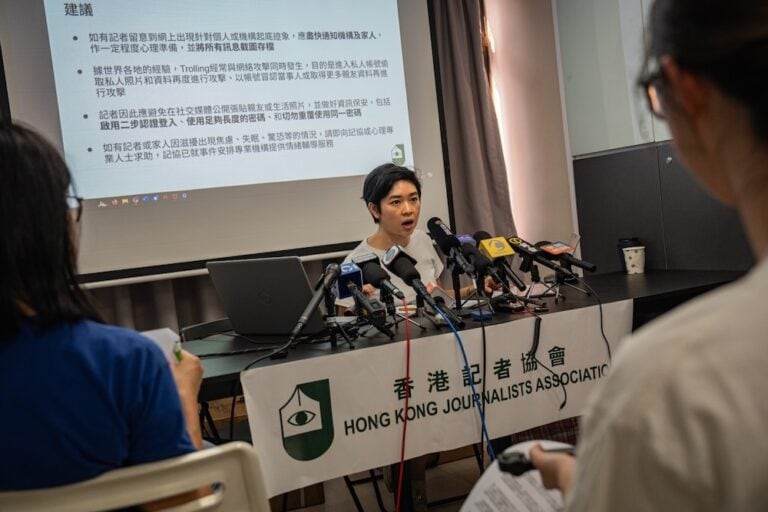IFJ criticises Hong Kong's largest free-to-air television station, TVB, for penalizing three journalists who helped prepare a news report about seven policemen beating up an Occupy Movement protester in October.
This statement was originally published on ifj.org on
The International Federation of Journalists (IFJ) criticises Hong Kong’s largest free-to-air television station, TVB, for penalizing three journalists who helped prepare a news report about seven policemen beating up an Occupy Movement protester on October 15, 2014.
Chief editor Wong Pun-Nam, assignments editor Peri Chow, and assistant assignments editor Ho Wing-Hong were on duty in the early hours of October 15, 2014. That day, a TVB camera operator captured exclusive footage of seven police officers pushing an Occupy Movement protester into a dark corner and beating him for four minutes. The incident occurred after police took action to clear a demonstration on Lung Wo Road, Admiralty, where a dozen protesters were trying to occupy the road outside the office of Hong Kong’s Chief Executive.
Ho wrote the script, with the approval of Chow and Wong, based on what he saw in the footage. The news item was broadcast in several early morning news bulletins. After the 6.30 bulletin, the two editors received a call from the head of the news department, Keith Yuen. When it was shown next, the voice-over describing the attack was deleted. This immediately drew a public outcry and allegations that TVB had self-censored. Several hours later, the news bulletin was aired again, with the voiceover script changed.
Yuen called an internal meeting to explain his decision, but Ho explained that the script was an objective account based on what he saw in the film. After the meeting, an unknown person posted a sound recording of the internal meeting on the internet, sparking fury among senior managers.
Two weeks later, Ho was demoted to chief researcher. On November 13, Wong was made assistant to the editor of the main daily prime news bulletin. Chow was told that he would lose a quarter of his annual bonus.
A journalist said: “We don’t know the truth, but based on the consequences that followed the incident it is legitimate for us to believe these are acts of revenge. We have never been informed that there is any system of punishment or the scale by which penalties are imposed. We are ‘punished’ according to the will of management.”
About 80 journalists issued an open letter about the editorial changes. They wrote: “Using this version (with the voice-over deleted) means the truth is missing from the report. We would like to reiterate that the script for the voice-over was factual and objective. The description did not involve any personal feeling or position.”
Six media associations, including the International Federation of Journalists’ affiliate the Hong Kong Journalists Association, issued a joint statement disputing Yuen’s explanation. In the statement they reminded the media, particularly senior management, not to self-censor their own reports.
Assistant professor of the Journalism Department of Hong Kong Baptist University, To Yiu-Ming, told Apple Daily: “This is obviously a revenge action after the incident on October 15. Yuen owes staff and the public of Hong Kong an explanation.”
The IFJ Asia-Pacific office said: “Such an act of revenge is very familiar to us because similar events are quite common in the Mainland media. Staff in the news department clearly understood that the original script was based on the facts, and the IFJ strongly opposes the move by management to self-censor.”
“The action is no longer an internal matter for a company to deal with. It is related to the principle of press freedom.”
We urge Keith Yuen to take up his responsibility to explain his actions to society, and also to explain the process and scale used for the punishment system.
We urge all TVB journalists and shareholders to call upon TVB management to uphold the rights of press freedom.


